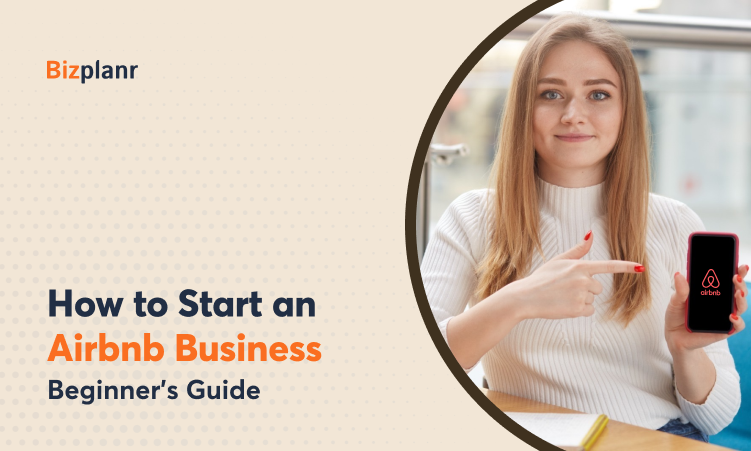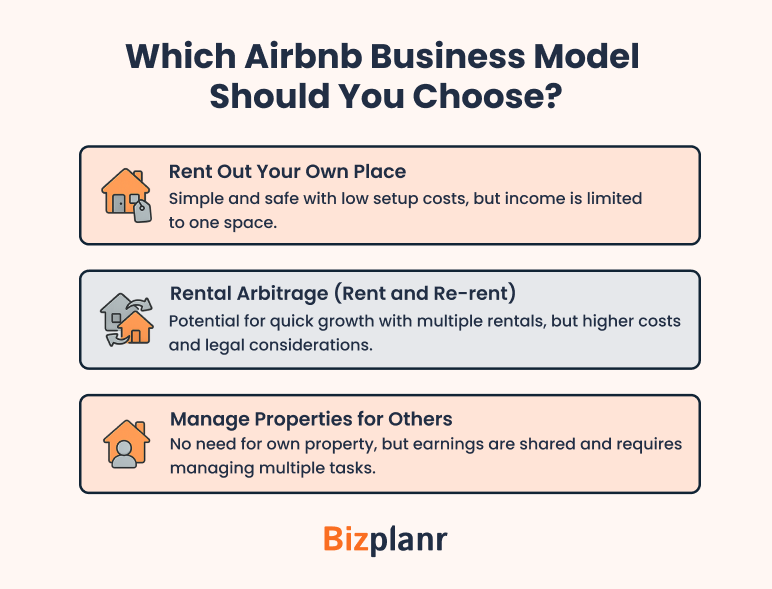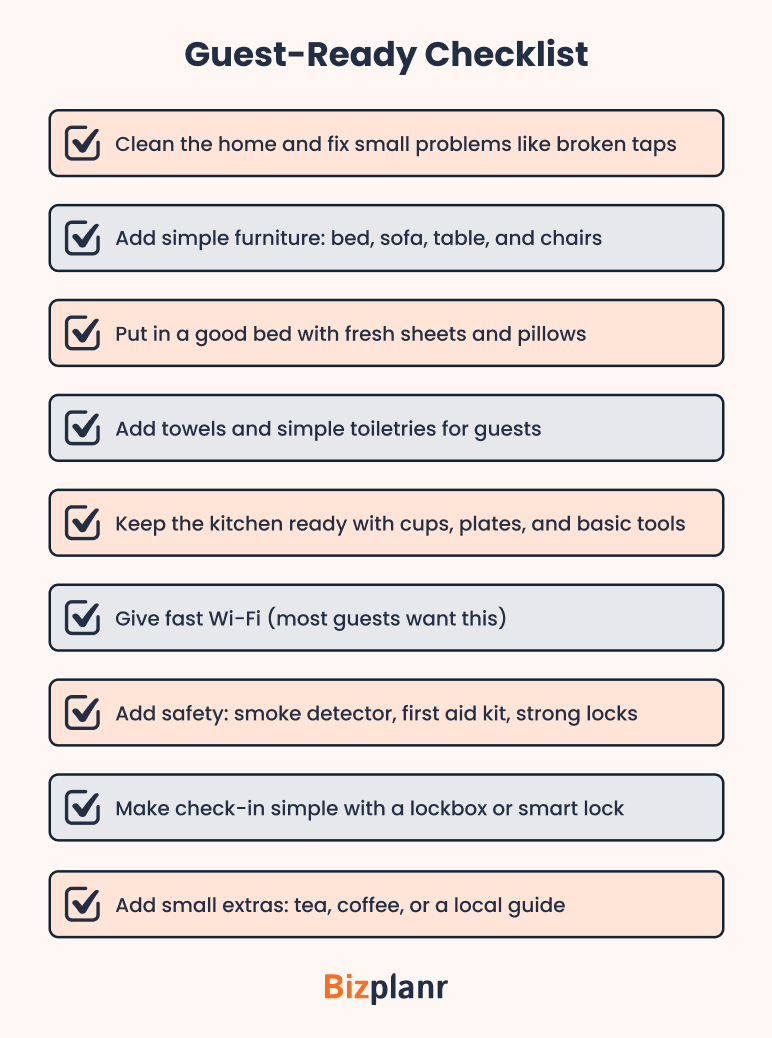Have you ever wanted to make extra money from a spare room or an empty home?
With Airbnb, you can! Millions of people now use Airbnb instead of hotels, which means more guests for new hosts.
Starting an Airbnb business is easier than you think. You don’t need a lot of money or many houses to begin. Many hosts start small with just one room. With a clear plan, you can turn it into a steady income or even a full-time job.
In this guide, we’ll show you how to start an Airbnb business step by step. You’ll learn how to plan your costs, get your space ready, create a strong listing, and welcome your first guests with confidence.
Key Takeaways
- Starting costs can be low. A single room may need a few hundred dollars, while a whole home may cost $3,000–$5,000 to set up.
- You can run Airbnb by using your own space, renting and re-renting, or managing homes for others.
- Happy guests are the key. Clean rooms, fast replies, and good reviews bring more bookings.
- Simple marketing and small improvements will help your business grow over time.
Step 1: Decide what type of Airbnb business you’ll run
Before starting, think about what kind of Airbnb business fits you best. The option you choose will decide how much money you spend, how much risk you take, and how much you can earn.
Here are the three main choices:
Option 1: Rent out your own place
If you already own a home or have a spare room, this is the easiest way to begin. You can list it on Airbnb with very little setup cost. You’ll just need to prepare the space with furniture, cleaning, and some basic amenities.
This option is simple and safe, but your income will only come from that one space.
Option 2: Rental arbitrage (rent and re-rent)
Here, you rent a property from a landlord and then list it on Airbnb. If the money from guests is more than your monthly rent, you make a profit.
This can grow quickly if you manage many rentals, but it also means higher starting costs for rent and furniture. You must also check that it’s legal in your area.
Option 3: Manage properties for others
In this case, you don’t use your own property. Instead, you take care of listings for other owners. You answer guest messages, arrange cleaning, and handle check-ins. In return, you get a share of the earnings.
This option doesn’t need much money to start, but it does take good people skills and time.
Which option should you choose?
Think about your current situation:
- If you want to start small with low cost → use your own space.
- If you can invest money and want bigger returns → try rental arbitrage.
- If you prefer less financial risk → manage listings for other owners.
Picking the right model will make the next steps much easier.
Step 2: Research your market
Once you’ve chosen your Airbnb model, the next step is to research your market. This helps you understand if people are booking in your area, what kind of guests visit, and how much you can realistically charge.
Without this step, you might spend time and money but still struggle to get bookings.
Start by looking at other Airbnb listings near you. Notice:
- How many similar properties are available
- The prices they charge per night
- How often do their calendars look booked
Reading guest reviews is also very useful. Reviews often highlight what travelers love and what they feel is missing. This gives you clear ideas on how you can improve your own listing.
Market research also shows you the bigger picture. Airbnb demand is rising—in the first quarter of 2025, travelers booked over 143.1 million nights and experiences.
That means plenty of guests are looking for short-term stays, but it also means more competition among hosts. Understanding your market helps you find ways to stand out.
Also, think about the kind of visitors in your area. For example:
- Apartments in city centers may attract business travelers
- Beach houses or cabins may draw families or tourists looking for longer stays
Finally, don’t forget local rules. Some cities need a license, and some limit how many days you can rent. Knowing this early saves you from issues later.
Doing this research gives you confidence and helps you prepare your Airbnb business the right way.
Step 3: Write a simple Airbnb business plan
Your Airbnb business plan should be short and simple. One page is enough. It will help you stay clear about what you want, what it will cost, and how you can make money.
Here are the key points to include:
| Plan Section | What to Include |
|---|---|
| Your goal | Write down what you want from your Airbnb. Do you just want some extra income from one place, or do you want to build a bigger business with many properties? |
| Your guest | Think about who will book your space. Business travelers, tourists, or families? Knowing your guest will help you set up your space in the right way. |
| Your platform & marketing | Airbnb is the main platform, but you can also share your listing on social media, travel sites, or work with local shops and businesses. |
| Your costs | Note down setup costs, like furniture, bedding, and kitchen items. Then add monthly costs such as rent, utilities, cleaning, and Airbnb service fees. |
| Your pricing | Check what other hosts charge in your area. Set your nightly rate so it covers your costs and gives you some profit. Change it during busy or slow seasons. |
Airbnb is competitive, with over 5 million hosts worldwide in 2025. Having a simple business plan will keep you focused and give you a better chance of succeeding.
Get Your Business Plan Ready In Minutes
Answer a few questions, and AI will generate a detailed business plan.
Step 4: Budget your startup costs
Before you start hosting on Airbnb, you need to plan your budget. This means knowing how much money you need to begin, what you’ll spend each month, and how much to charge per night so you can earn a profit.
Here are the common costs:
- Property cost (rent or mortgage) – $800 to $2,000 per month
- Furniture and setup – $2,000 to $5,000
- Property cleaning – $40 to $100 each time
- Guest supplies – $50 to $150 per month
- Bills and utilities – $150 to $300 per month
- Airbnb fee – About 3% of each booking
- Licenses and insurance – $100 to $500
Some costs, like furniture, are one-time. While rent, bills, and cleaning are monthly.
Adding them up will show you the minimum income you need.
Once you know your costs, set your nightly price. Here are rough price ranges:
- Private room – $40 to $80 per night
- Small apartment – $80 to $150 per night
- Large home or villa – $150 to $300+ per night
Suppose, if your rent is $1,200, furniture costs $3,000 (one-time), utilities are $200, and cleaning is $200 a month, your monthly cost is about $1,600.
If you charge $120 per night and get 20 bookings, you’ll make $2,400. That leaves around $800 profit after costs.
A simple budget and smart pricing strategy will guide your Airbnb business and keep it profitable.
Step 5: Set up your business legally
After planning your costs, the next step is to make your Airbnb business legal. This is important because it protects you from fines and problems. It also makes your business look professional and safe.
Here’s what to do:
- Pick a name – Choose a short, easy name for your Airbnb business. It should be simple to say and remember.
- Choose a legal structure – The easiest way is to start as a sole proprietor. If you want more protection, you can register an LLC or company later.
- Register your business – Some cities ask you to register your Airbnb as a business. This usually costs between $50 and $300.
- Get a permit or license – Many places require a short-term rental license before you can host. Check your city’s rules.
- Take care of taxes – Airbnb may collect guest taxes, but you must still report your income for yearly taxes.
- Get insurance – Normal home insurance may not cover guests. Host insurance or rental insurance gives you extra safety.
- Check your lease – If you rent the property, make sure your landlord allows Airbnb. Always get permission in writing.
These steps may feel like extra work, but they’re very important. Once you set up legally, you can run your Airbnb with peace of mind.
Step 6: Prepare your property for guests
Before you start hosting, get your place ready for guests. A clean and safe home makes guests happy. Happy guests give good reviews, and good reviews bring you more bookings. Use a checklist to make sure you don’t miss anything.
This checklist helps you prepare step by step. You don’t need fancy things. If your place is clean, safe, and has the basics, guests will feel comfortable. This will bring you good reviews and more bookings.
Step 7: Build your Airbnb listing
Your Airbnb listing is the first thing guests see. If it looks good and clear, people will want to book your place.
To make it effective, focus on the basics that guests care about most—like photos, price, and clear details. Here’s what to include:
Title and description
Write a short title that tells what your place is. For example: “Small Room Near Airport” or “Family Apartment in Downtown.” Add a short description. Say what makes your place good, like location or comfort. Keep it simple.
Photos
Photos matter the most. Take them in daylight so the rooms look bright. Show the bed, kitchen, bathroom, and living area. Add one outside photo too. Make sure everything looks clean.
Amenities
Guests like to know what they’ll get. Write down all items you provide: Wi-Fi, towels, soap, coffee, or parking. Even small things are important.
Price
Check other listings near you. Set a price close to them. Not too high, not too low. You can change the price later if needed.
House rules
Tell guests the rules clearly, such as " no smoking” or “check out by 11 a.m.” Clear rules avoid problems.
A strong listing builds trust. It shows guests exactly what they can expect, reduces questions or confusion, and makes them feel confident about booking your place.
Step 8: Plan for operations and guest management
When you start hosting, you must manage daily work. Hosting is not only about getting bookings. It’s also about keeping your place clean, ready, and making sure guests feel happy.
Here are the main things to manage:
| Task | What to Do |
|---|---|
| Cleaning | Clean the property after every guest. Put fresh sheets and towels. You can clean yourself or hire a cleaner. |
| Talking to guests | Reply fast to guest questions. Guests may ask about check-in, directions, or for small help. A quick answer makes them feel welcome. |
| Check-in / out | Decide how guests will arrive. You can meet them in person or use a lockbox or smart lock if you are busy. |
| Supplies | Always keep basics ready: soap, shampoo, toilet paper, tea, coffee, and kitchen tools. Refill them after each stay. |
| Small problems | Be ready for issues like late check-outs, no internet, or something breaking. Have a simple plan to fix these fast. |
If you keep your property clean, stocked, and easy to use, guests will enjoy their stay.
Step 9: Market your Airbnb
After your listing is ready, you need to market it so guests can see it. A property will not get bookings if people don’t know about it. Using the right marketing strategies helps you stand out and bring in more guests.
The first step is your Airbnb listing itself. Use bright photos, a clear title, and a simple description. These are the first things guests notice when searching.
Then, share your listing outside of Airbnb. Post it on social media like Facebook or Instagram. Ask family and friends to share it too. This can help more people find your place.
You can also use local promotion. Talk to nearby cafés, shops, or travel services. They may suggest your property to visitors.
When starting out, it helps to give small discounts. Lower prices in the beginning can bring your first guests. Once you get good reviews, you can raise your price again. Reviews are very important because new guests trust them.
Good marketing is simple. Focus on clear photos, sharing your listing, and earning positive reviews. If you do these well, guests will find you, and your bookings will grow.
Step 10: Launch and monitor performance
Now it’s time to launch your Airbnb and welcome your first guests. This is an exciting step because your hard work is finally live. Your first few bookings are very important. They bring you your first reviews, and those reviews will help you grow.
At the start, you don’t need to do anything big. Share your listing with friends or family and ask them to spread the word.
You can also set a slightly lower price in the beginning. This will help you get bookings faster and collect reviews. Once you have good reviews, more guests will trust your place.
After you launch, start monitoring your results. Ask yourself:
👉 Are guests finding my listing easily?
👉 How many bookings am I getting?
👉 What do my reviews say about the experience?
The answers to these questions will show you where to improve. If reviews mention slow replies, focus on answering faster. If people ask about something not listed, add it to your description.
Launching is just the beginning. By paying attention to feedback and making small changes, you will build trust with guests, get better reviews, and grow your bookings over time.
5 Mistakes to avoid (and how to fix them)
Airbnb can be a good business, but small mistakes can cause big problems. Here are 5 common mistakes and how to fix them:
1) Ignoring local laws
Every city has different rules for rentals. If you don’t follow them, you may get fined.
Fix: Check the rules in your city and get the permits you need.
2) Forgetting costs
Many hosts think only about rent. They forget cleaning, repairs, and taxes. This lowers profit.
Fix: Write down all costs. Include both one-time costs and monthly costs.
3) Bad photos
Dark or messy photos make your place look bad.
Fix: Take photos in daylight. If you can, hire a good photographer.
4) Overbooking guests
If you don’t update your calendar, two guests may book the same dates. This upsets guests.
Fix: Use Airbnb’s calendar and booking tools to avoid double bookings.
5) Treating it as passive income
Airbnb needs attention. If you ignore it, your business won’t grow.
Fix: Stay active, reply fast to guests, and follow market trends.
Avoiding these mistakes will make your guests happy and your Airbnb more successful.
Final thoughts
And that’s it! We’ve gone through the main steps to start your Airbnb business—from picking your model and setting a budget to preparing your space, following the rules, and going live with your listing.
Of course, new challenges will come. You’ll need to manage bookings, handle guest needs, and keep your place in great shape. But with a clear plan and steady effort, hosting will become smoother and more rewarding over time.
To make the process easier, tools like Bizplanr can help you build a simple Airbnb business plan in minutes. This way, you can stay focused on what really matters: Happy guests and steady income.
Wishing you success as you begin your Airbnb hosting journey!
Frequently Asked Questions
Do I need to own a property to start an Airbnb?
No. You can use your own home, rent a place (with permission), or help other owners manage theirs.
How much money do I need to start an Airbnb business?
It depends. A single room may need only a few hundred dollars for setup. A full home may cost $3,000–$5,000 to prepare.
Do I need a license to host on Airbnb?
In many cities, yes. Some ask for a short-term rental license or permit. Check your local rules first.
How much can I earn from Airbnb?
A private room can earn $400–$800 per month. A whole home in a busy area can make $3,000–$5,000+ per month.
Is Airbnb hosting a full-time job?
Not always. Some hosts manage one room part-time, while others build full businesses with multiple listings.







